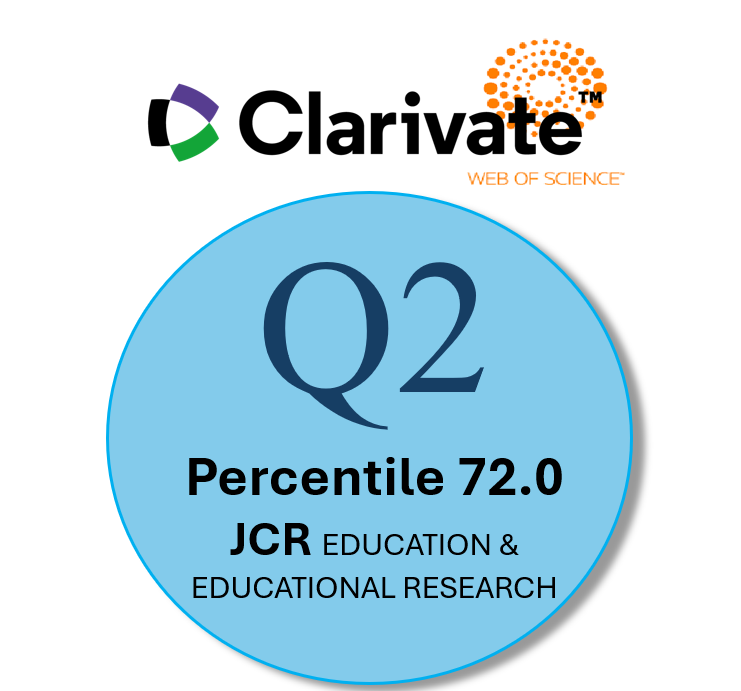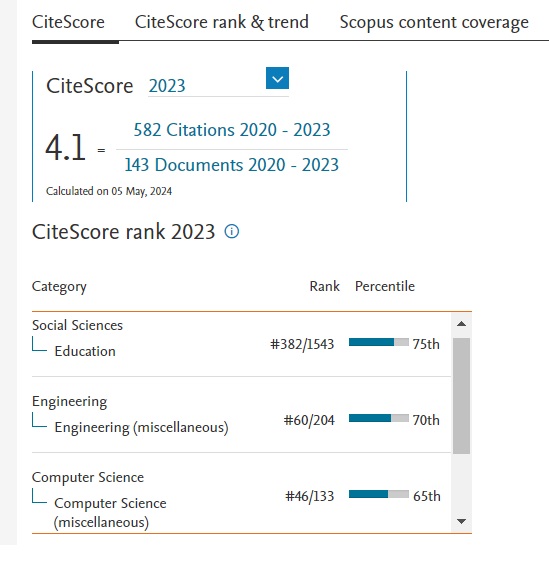La transformación hacia experiencias expandidas en educación superior: curso #UAMskills de identidad digital
Agencias de apoyo
- Este trabajo ha sido financiado por el Ministerio de Economía, Industria y Competitividad (MINECO), la Agencia Estatal de Investigación (AEI) y el Fondo Europeo de Desarrollo Regional (FEDER, UE) [número de referencia del proyecto: EDU217-83363-R].
Resumen
En este artículo se analiza la transformación de un curso de educación superior de la UAM, que durante años se desarrolló de manera presencial, en experiencia de aprendizaje remoto expandido, es decir, mediado por el espacio y cultura digital. La aproximación pedagógica de la personalización educativa—diversificación de recursos, estrategias y actuaciones para facilitar que los aprendices otorguen sentido y valor personal a los aprendizajes—ha sido fundamental para orientar el proyecto de investigación acción que aquí se presenta. Se han incorporado actividades de carácter abierto, usando herramientas y plataformas de la web social, que han habilitado a los participantes, constituidos como comunidad de práctica, a crear conocimiento antes, durante y después de las sesiones síncronas, así como, difundirlo en redes, conversar con otros interesados externos y recuperarlo con posterioridad. En las conclusiones se pone de manifiesto como articular la diversidad cultural y de trayectorias de participación en el actual escenario social de complejidad e incertidumbre, legitima la relevancia de la personalización educativa para facilitar aprendizajes situados y con sentido, desarrollando experiencias expandidas, flexibles y distribuidas en torno a una narrativa transmedia que naturalice la cultura digital en lo que a oportunidades y procesos de aprendizaje se refiere.
Descargas
-
Resumen3109
-
PDF1792
Citas
Akama, Y., Pink, S., y Sumartojo, S. (2018). Uncertainty and Possibility. New Approaches to Future Making in Design Anthropology. Routledge.
Álvarez-Arregui, E. (2019). Evolución de la Universidad en la Sociedad del Aprendizaje y la Enseñanza. El valor de las competencias en el desarrollo profesional y personal. Aula Abierta, 48(4), 349-372. https://doi.org/10.17811/rifie.48.4.2019.349-372
Álvarez-Arregui, E., y Arreguit, X. (2019). El futuro de la Universidad y la Universidad del Futuro. Ecosistemas de formación continua para una sociedad de aprendizaje y enseñanza sostenible y responsable. Aula Abierta, 48(4), 447-480. https://doi.org/10.17811/rifie.48.4.2019.447-480
Barron, B. (2006). Interest and Self-Sustained Learning as Catalysts of Development: A Learning Ecology Perspective. Human Development, 49(4), 193-224. https://doi.org/10.1159/000094368
Bozkurt, A., y Sharma, R. C. (2020). Emergency remote teaching in a time of global crisis due to CoronaVirus pandemic. Asian Journal of Distance Education, 15(1), i-vi. https://doi.org/10.5281/zenodo.3778083
Bronfenbrenner, U. (1985). Contexts of child rearing problems and prospects. Journal for the Study of Education and Development, 8(29), 45-55. https://doi.org/10.1080/02103702.1985.10822058
Bronfenbrenner, U. (1987). La ecología del desarrollo humano. Experimentos en entornos naturales y diseñados. Paidós.
Bruner, J. S., y Palacios, J. (2008). Desarrollo cognitivo y educación (6.a ed.). Morata.
Castells, M. (2009). Comunicación y poder. Alianza.
Chen, C. M. (2008). Intelligent web-based learning system with personalized learning path guidance. Computers y Education, 51(2), 787-814. https://doi.org/10.1016/j.compedu.2007.08.004
Coll, C. (2013). El currículo escolar en el marco de la nueva ecología del aprendizaje. Aula de Innovación Educativa, 219, 31-36.
Coll, C. (2018). La personalización del aprendizaje escolar, una exigencia de la nueva ecología del aprendizaje. Dosier Graó: La personalización del aprendizaje, 3, 5-11.
Coll, C., Esteban-Guitart, M., y Iglesias, E. (2020). Aprenentatge amb sentit i valor personal. Estratègies, recursos i experiències de personaltizació educativa. Graó.
DiGiacomo, D. K., Van Horne, K., Van Steenis, E., y Penuel, W. R. (2018). The material and social constitution of interest. Learning, Culture and Social Interaction, 19, 51-60. https://doi.org/10.1016/j.lcsi.2018.04.010
Esteban-Guitart, M. (2016). Funds of Identity. Connecting Meaningful Learning Experiences in and out of School. Cambridge University Press. https://doi.org/10.1017/CBO9781316544884
Esteban-Guitart, M. (2019). Identity in education and education in identities: Connecting curriculum and school practice to students’ lives and identities. En P. Hviid y M. Martsin (Eds.), Culture in education and education in culture (pp. 159-175). Springer.
Esteban-Guitart, M., Coll, C., y Penuel, W. R. (2018). Learning across Settings and Time in the Digital Age. Digital Education Review, 33, 1-16. https://doi.org/10.1344/der.2018.33.%p
Esteban-Guitart, M., y Gee, J. P. (2020). “Inside the head and out in the world”. An approach to deep teaching and learning. Multidisciplinary Journal of Educational Research, 10, 1-25. https://doi.org/10.4471/remie.2020.4868
Esteban-Guitart, M., y Moll, L. C. (2014). Funds of Identity: A new concept based on the Funds of Knowledge approach: Culture y Psychology, 20(1), 31-48. https://doi.org/10.1177/1354067X13515934
Esteban-Guitart, M., Monreal-Bosch, P., Palma, M., y González-Ceballos, I. (2020). Sustaining Students’ Identities within the Context of Participatory Culture. Designing, Implementing and Evaluating an Interactive Learning Activity. Sustainability, 12(12), 4870. https://doi.org/10.3390/su12124870
Esteban-Guitart, M., Serra, J. M., y Vila, I. (2017). Informationalism and informalization of learnings in 21st century. A qualitative study on meaningful learning experiences. Social and Education History, 6(1), 1-25. https://doi.org/10.17583/hse.2017.2111
Gee, J. P. (2010). New digital media and learning as an emerging area and «worked examples» as one way forward. The MIT Press.
Gee, J. P. (2013). The anti-education era: Creating smarter students through digital learning. Palgrave Macmillan.
Gee, J. P., y Esteban-Guitart, M. (2019). Designing for deep learning in the context of digital and social media. [El diseño para el aprendizaje profundo en los medios de comunicación sociales y digitales]. Comunicar, 58, 9-18. https://doi.org/10.3916/C58-2019-01
Giani, M., y Fox, H. L. (2017). Do stackable credentials reinforce stratification or promote upward mobility? An analysis of health professions pathways reform in a community college consortium. Journal of Vocational Education y Training, 69(1), 100-122. https://doi.org/10.1080/13636820.2016.1238837
González-Martínez, J., Esteban-Guitart, M., Rostan-Sanchez, C., Serrat-Sellabona, E., y Estebanell-Minguell, M. (2019). What’s up with transmedia and education? A literature review. Digital Education Review, 36, 207-222. https://doi.org/10.1344/der.2019.36.207-222
González-Patiño, J. (2011). Rutinas de la infancia urbana mediadas por la tecnología: Un análisis visual. Papeles de Trabajo sobre Cultura, Educación y Desarrollo Humano, 7(2), 1-16.
González-Patiño, J. (2012). Mediática | Inspiring the new learning for the digital culture. https://mediatica.co/
González-Patiño, J. (2018). Learn, Teach and Share, Participation in Expanded Educational Communities: Madrid Pikler Seminar as a Practice of Continuing Education between Childhood Professionals. Digital Education Review, 33, 203-216. https://doi.org/10.1344/der.2018.33.203-216
González-Patiño, J., y Esteban-Guitart, M. (2014). Some of the challenges and experiences of formal education in a Mobile-Centric Society (MCS). Digital Education Review, 25, 64-86. https://doi.org/10.1344/der.2014.25.64-86
González-Patiño, J., y Esteban-Guitart, M. (2015). Fondos digitales de conocimiento e identidad: Un análisis etnográfico y visual. Papeles de Trabajo sobre Cultura, Educación y Desarrollo Humano, 11(2), 20-25.
González-Patiño, J., y Esteban-Guitart, M. (2019). Affinity online: How connection and shared interest fuel learning. Mind, Culture, and Activity, 26(4), 383-386. https://doi.org/10.1080/10749039.2019.1680695
Grant, P., y Basye, D. (2014). Personalized learning: A guide for engaging students with technology. International Society for Technology in Education.
Horst, H. A., y Miller, D. (2012). Digital anthropology. Berg.
Iglesias, E., González-Patiño, J., Lalueza, J. L., y Esteban-Guitart, M. (2020). Por una educación crítica, intergeneracional, sostenible y comunitaria. Manifiesto en tiempos de pandemia. Revista Internacional de Educación para la Justicia Social (RIEJS), 9(3).
Ito, M., Gutiérrez, K., Livingstone, S. M., Penuel, B., Rhodes, J., Salen, K., Schor, J., Sefton-Green, J., y Watkins, S. C. (2013). Connected Learning: An Agenda for Research and Design. Digital Media and Learning Research Hub.
Jenkins, H. (2008). Convergence culture: La cultura de la convergencia de los medios de comunicación. Paidós.
Jenkins, H., Ford, S., y Green, J. (2013). Spreadable media: Creating value and meaning in a networked culture. New York University Press.
Jenkins, H., Ito, M., y boyd, danah. (2015). Participatory culture in a networked era: A conversation on youth, learning, commerce, and politics. Polity Press.
Jubany, J. (2012). Aprendizaje social y personalizado: Conectarse para aprender. Editorial UOC. https://www.editorialuoc.cat/aprendizaje-social-y-personalizado-conectarse-para-aprender
Kalantzis, M., y Cope, B. (2012). New learning: Elements of a science of education (2.a ed.). Cambridge University Press.
Lafuente, A., Gómez, D., y Freire, J. (2018). El arte de documentar. Zenodo. https://doi.org/10.5281/zenodo.1195211
Lave, J., y Wenger, E. (1991). Situated learning: Legitimate peripheral participation. Cambridge University Press.
Minguillón, J., Mor, E., Santanach, F., y Guàrdia, L. (2005). Personalización del proceso de aprendizaje usando learning objects reutilizables. Revista de Educación a Distancia (RED), IV, 1-14.
Mitchell, C. (2011). Doing visual research. Sage Publications.
Nasir, N. S., de Royston, M. M., Barron, B., Bell, P., Pea, R., Stevens, R., y Goldman, S. (2020). Learning pathways. En N. S. Nasir, C. D. Lee, R. Pea, y M. M. de Royston (Eds.), Handbook of the Cultural Foundations of Learning (pp. 201-218). Routledge.
Oliveira, A. M. C., y Coelho, C. M. M. (2020). Subjective development process as a path to school learning: The classroom as a dialogic relational context. Studies in Psychology, 41(1), 115-137. https://doi.org/10.1080/02109395.2019.1710803
Penuel, W. R., y Johnson, R. (2016). Review of Continued Progress: Promising Evidence on Personalized Learning. National Education Policy Center. https://nepc.colorado.edu/thinktank/review-personalized-learning
Pereira, S., Fillol, J., y Moura, P. (2019). Young people learning from digital media outside of school: The informal meets the formal. [El aprendizaje de los jóvenes con medios digitales fuera de la escuela: De lo informal a lo formal]. Comunicar, 58, 41-50. https://doi.org/10.3916/C58-2019-04
Pérez Guerrero, J., y Ahedo Ruiz, J. (2020). La educación personalizada según García Hoz. Revista Complutense de Educación, 31(2), 153-161. https://doi.org/10.5209/rced.61992
Perin, D. (2011). Facilitating Student Learning Through Contextualization: A Review of Evidence. Community College Review, 39(3), 268-295. https://doi.org/10.1177/0091552111416227
Pink, S. (2013). Doing visual ethnography: Images, media, and representation in research (3a). SAGE.
Rodríguez-Ruiz, B., Álvarez-Blanco, L., Martínez-González, R. A., y Epstein, J. L. (2019). Presentación del número Relación entre Centros Educativos, Familias y Entidades Comunitarias. Aula Abierta, 48(1), 7-10. https://doi.org/10.17811/rifie.48.1.2019
Sáiz-Manzanares, M. C., y Queiruga-Dios, M. Á. (2017). Evaluación de estrategias metacognitivas: Aplicación de métodos online. Revista de Psicología y Educación - Journal of Psychology and Education, 13(1), 23. https://doi.org/10.23923/rpye2018.01.156
Sanz, S. (2005). Gestión de comunidades de práctica virtuales: Acceso y uso de contenidos. RUSC. Universities and Knowledge Society Journal, 2(2), 26-35. https://doi.org/10.7238/rusc.v2i2.259
Staus, N. L., Falk, J. H., Penuel, W., Dierking, L., Wyld, J., y Bailey, D. (2020). Interested, Disinterested, or Neutral: Exploring STEM Interest Profiles and Pathways in A Low-Income Urban Community. Eurasia Journal of Mathematics, Science and Technology Education, 16(6), em1853. https://doi.org/10.29333/ejmste/7927
Tarabini, A. (2020). ¿Para qué sirve la escuela? Reflexiones sociológicas en tiempos de pandemia global. Revista de Sociología de la Educación-RASE, 13(2), 145-155. https://doi.org/10.7203/RASE.13.2.17135
Thomson, P. (2010). Doing visual research with children and young people. Routledge.
Van Dijck, J. (2013). The culture of conectivity: A critical history of social media. Oxford University Press.
Walkington, C., y Hayata, C. A. (2017). Designing learning personalized to students’ interests: Balancing rich experiences with mathematical goals. ZDM, 49(4), 519-530. https://doi.org/10.1007/s11858-017-0842-z
Wardrop, A., y Withers, D. M. (2014). The para-academic handbook: A toolkit for making-learning-creating-acting. HammerOn Press.
Wenger, E. (2005). Communities of practice: Learning, meaning, and identity. Cambridge University Press.
Wenger, E., McDermott, R., y Snyder, W. (2002). Cultivating communities of practice: A guide to managing knowledge. Harvard Business School Press.
- 08-01-2021 (3)
- 08-11-2020 (2)
- 30-10-2020 (1)
Derechos de autor 2020 Revista de Educación a Distancia (RED)

Esta obra está bajo una licencia internacional Creative Commons Atribución-NoComercial 4.0.
Las obras que se publican en esta revista están sujetas a los siguientes términos:
1. El Servicio de Publicaciones de la Universidad de Murcia (la editorial) conserva los derechos patrimoniales (copyright) de las obras publicadas, y favorece y permite la reutilización de las mismas bajo la licencia de uso indicada en el punto 2.
2. Las obras se publican en la edición electrónica de la revista bajo una licencia Creative Commons Reconocimiento-NoComercial-SinObraDerivada 3.0 España (texto legal). Se pueden copiar, usar, difundir, transmitir y exponer públicamente, siempre que: i) se cite la autoría y la fuente original de su publicación (revista, editorial y URL de la obra); ii) no se usen para fines comerciales; iii) se mencione la existencia y especificaciones de esta licencia de uso.
3. Condiciones de auto-archivo. Se permite y se anima a los autores a difundir electrónicamente las versiones pre-print (versión antes de ser evaluada) y/o post-print (versión evaluada y aceptada para su publicación) de sus obras antes de su publicación, ya que favorece su circulación y difusión más temprana y con ello un posible aumento en su citación y alcance entre la comunidad académica. Color RoMEO: verde.














